- Home
- Gregory Maguire
Wicked: The Life and Times of the Wicked Witch of the West
Wicked: The Life and Times of the Wicked Witch of the West Read online
WICKED
The Life and Times of
the Wicked Witch of the West
A NOVEL
GREGORY MAGUIRE
ILLUSTRATIONS BY DOUGLAS SMITH
This book is for Betty Levin and for all those who
taught me to love and fear goodness.
CONTENTS
E-Book Extras
Maps of the Land of Oz
Epigraphs
Prologue: On the Yellow Brick Road
I Munchkinlanders
The Root of Evil
The Clock of the Time Dragon
The Birth of a Witch
Maladies and Remedies
The Quadling Glassblower
Geographies of the Seen and the Unseen
Child’s Play
Darkness Abroad
II Gillikin
Galinda
Boq
The Charmed Circle
III City of Emeralds
IV In the Vinkus
The Voyage Out
The Jasper Gates of Kiamo Ko
Uprisings
V The Murder and Its Afterlife
Map of the Land of Oz
West
East
Details:
Southwest
Southeast
Northeast
Northwest
READING GROUP GUIDE
Acknowledgments
About the Author
Praise for
Credits
Copyright
About the Publisher
E-Book Extras
Wicked’s Reader’s Group Guide
THE WONDERFUL WIZARD OF OZ
by L.Frank Baum
‘Tis very strange Men should be so fond of being thought wickeder than they are.
—DANIEL DEFOE, A SYSTEM OF MAGICK
In historical events great men—so called—are but the labels that serve to give a name to an event, and like labels, they have the last possible connection with the event itself. Every action of theirs, that seems to them an act of their own free will, is in an historical sense not free at all, but in bondage to the whole course of previous history, and predestined from all eternity.
—LEO NIKOLAEVICH TOLSTOI, WAR AND PEACE
“Well,” said the Head, “I will give you my answer. You have no right to expect me to send you back to Kansas unless you do something for me in return. In this country everyone must pay for everything he gets. If you wish me to use my magic power to send you home again you must do something for me first. Help me and I will help you.” “What must I do?” asked the girl. “Kill the wicked Witch of the West,” answered Oz.
—L. FRANK BAUM, THE WONDERFUL WIZARD OF OZ
PROLOGUE
On the Yellow Brick Road
A mile above Oz, the Witch balanced on the wind’s forward edge, as if she were a green fleck of the land itself, flung up and sent wheeling away by the turbulent air. White and purple summer thunderheads mounded around her. Below, the Yellow Brick Road looped back on itself, like a relaxed noose. Though winter storms and the crowbars of agitators had torn up the road, still it led, relentlessly, to the Emerald City. The Witch could see the companions trudging along, maneuvering around the buckled sections, skirting trenches, skipping when the way was clear. They seemed oblivious of their fate. But it was not up to the Witch to enlighten them.
She used the broom as a sort of balustrade, stepping down from the sky like one of her flying monkeys. She finished up on the topmost bough of a black willow tree. Beneath, hidden by the fronds, her prey had paused to take their rest. The Witch tucked her broom under her arm. Crablike and quiet, she scuttled down a little at a time, until she was a mere twenty feet above them. Wind moved the dangling tendrils of the tree. The Witch stared and listened.
There were four of them. She could see a huge Cat of some sort—a Lion, was it?—and a shiny woodman. The Tin Woodman was picking nits out of the Lion’s mane, and the Lion was muttering and squirming from the aggravation. An animated Scarecrow lolled nearby, blowing dandelion heads into the wind. The girl was out of sight behind shifting curtains of the willow.
“Of course, to hear them tell it, it is the surviving sister who is the crazy one,” said the Lion. “What a Witch. Psychologically warped; possessed by demons. Insane. Not a pretty picture.”
“She was castrated at birth,” replied the Tin Woodman calmly. “She was born hermaphroditic, or maybe entirely male.”
“Oh you, you see castration everywhere you look,” said the Lion.
“I’m only repeating what folks say,” said the Tin Woodman.
“Everyone is entitled to an opinion,” said the Lion airily. “She was deprived of a mother’s love, is how I’ve heard it. She was an abused child. She was addicted to medicine for her skin condition.”
“She has been unlucky in love,” said the Tin Woodman, “like the rest of us.” The Tin Woodman paused and placed his hand on the center of his chest, as if in grief.
“She’s a woman who prefers the company of other women,” said the Scarecrow, sitting up.
“She’s the spurned lover of a married man.”
“She is a married man.”
The Witch was so stunned that she nearly lost her grip on the branch. The last thing she ever cared for was gossip. Yet she had been out of touch for so long that she was astonished at the vigorous opinions of these random nobodies.
“She’s a despot. A dangerous tyrant,” said the Lion with conviction.
The Tin Woodman pulled harder than was necessary on a lock of mane. “Everything’s dangerous to you, you craven thing. I hear she’s a champion of home rule for the so-called Winkies.”
“Whoever she is, she must surely be grieving the death of her sister,” said the child, in a somber voice too rich, too sincere for one so young. The Witch’s skin crawled.
“Don’t go feeling sympathetic now. I certainly can’t.” The Tin Woodman sniffed, a bit cynically.
“But Dorothy’s right,” said the Scarecrow. “No one is exempt from grief.”
The Witch was deeply irked by their patronizing speculations. She moved around the trunk of the tree, stretching to catch a glimpse of the child. The wind was picking up, and the Scarecrow shivered. While the Tin Woodman continued fussing over the Lion’s tresses, he leaned against the Lion, who held him tenderly. “Storm on the horizon,” said the Scarecrow.
Miles off, thunder echoed. “There—is—a—Witch on the horizon,” said the Tin Woodman, tickling the Lion. The Lion got spooked and rolled on top of the Scarecrow, whimpering, and the Tin Woodman collapsed on top of them both.
“Good friends, should we be wary of that storm?” said the girl.
The rising winds moved the curtain of greenery at last, and the Witch caught sight of the girl. She was sitting with her feet tucked underneath her and her arms wrapped around her knees. She was not a dainty thing but a good-size farm girl, dressed in blue-and-white checks and a pinafore. In her lap, a vile little dog cowered and whined.
“The storm makes you skittish. It’s natural after what you’ve been through,” said the Tin Woodman. “Relax.”
The Witch’s fingers dug into the bark of the tree. She still could not see the girl’s face, just her strong forearms and the crown of her head where her dark hair was pulled back into pigtails. Was she to be taken seriously, or was she merely a blow-away dandelion seed, caught on the wrong side of the wind? If she could see the girl’s face, the Witch felt she might know.
But as the Witch craned outward from the trunk, the girl at the same time twisted her face, turning away. “Th
at storm is coming closer, and in a hurry.” The feeling in her voice rose as the wind rose. She had a throaty vehemence, like someone arguing through the threat of impending tears. “I know storms, I know how they come upon you!”
“We’re safer here,” said the Tin Woodman.
“Certainly we are not,” answered the girl, “because this tree is the highest point around, and if lightning is to strike, it will strike here.” She clutched her dog. “Didn’t we see a shed farther up the road? Come, come; Scarecrow, if there’s lightning, you’ll burn the fastest! Come on!”
She was up and running in an ungainly way, and her companions followed in a mounting panic. As the first hard drops of rain fell, the Witch caught sight, not of the girl’s face, but of the shoes. Her sister’s shoes. They sparkled even in the darkening afternoon. They sparkled like yellow diamonds, and embers of blood, and thorny stars.
If she had seen the shoes first, the Witch would never have been able to listen to the girl or her friends. But the girl’s legs had been tucked beneath her skirt. Now the Witch was reminded of her need. The shoes should be hers!—hadn’t she endured enough, hadn’t she earned them? The Witch would fall on the girl from the sky, and wrestle those shoes off her impertinent feet, if only she could.
But the storm from which the companions raced, farther and faster along the Yellow Brick Road, troubled the Witch more than it did the girl who had gone through rain and the Scarecrow whom lightning could burn. The Witch could not venture out in such a vicious, insinuating wetness. Instead, she had to tuck herself between some exposed roots of the black willow tree, where no water could endanger her, and wait for the storm to pass.
She would emerge. She always had before. The punishing political climate of Oz had beat her down, dried her up, tossed her away—like a seedling she had drifted, apparently too desiccated ever to take root. But surely the curse was on the land of Oz, not on her. Though Oz had given her a twisted life, hadn’t it also made her capable?
No matter that the companions had hurried away. The Witch could wait. They would meet again.
The Root
of Evil
From the crumpled bed the wife said, “I think today’s the day. Look how low I’ve gone.”
“Today? That would be like you, perverse and inconvenient,” said her husband, teasing her, standing at the doorway and looking outward, over the lake, the fields, the forested slopes beyond. He could just make out the chimneys of Rush Margins, breakfast fires smoking. “The worst possible moment for my ministry. Naturally.”
The wife yawned. “There’s not a lot of choice involved. From what I hear. Your body gets this big and it takes over—if you can’t accommodate it, sweetheart, you just get out of its way. It’s on a track of its own and nothing stops it now.” She pushed herself up, trying to see over the rise of her belly. “I feel like a hostage to myself. Or to the baby.”
“Exert some self-control.” He came to her side and helped her sit up. “Think of it as a spiritual exercise. Custody of the senses. Bodily as well as ethical continence.”
“Self-control?” She laughed, inching toward the edge of the bed. “I have no self left. I’m only a host for the parasite. Where’s my self, anyway? Where’d I leave that tired old thing?”
“Think of me.” His tone had changed; he meant this.
“Frex”—she headed him off—“when the volcano’s ready there’s no priest in the world can pray it quiet.”
“What will my fellow ministers think?”
“They’ll get together and say, ‘Brother Frexspar, did you allow your wife to deliver your first child when you had a community problem to solve? How inconsiderate of you; it shows a lack of authority. You’re fired from the position.’” She was ribbing him now, for there was no one to fire him. The nearest bishop was too distant to pay attention to the particulars of a unionist cleric in the hinterland.
“It’s just such terrible timing.”
“I do think you bear half the blame for the timing,” she said. “I mean, after all, Frex.”
“That’s how the thinking goes, but I wonder.”
“You wonder?” She laughed, her head going far back. The line from her ear to the hollow below her throat reminded Frex of an elegant silver ladle. Even in morning disarray, with a belly like a scow, she was majestically good-looking. Her hair had the bright lacquered look of wet fallen oak leaves in sunlight. He blamed her for being born to privilege and admired her efforts to overcome it—and all the while he loved her, too.
“You mean you wonder if you’re the father”—she grabbed the bedstead; Frex took hold of her other arm and hauled her half-upright—“or do you question the fatherliness of men in general?” She stood, mammoth, an ambulatory island. Moving out the door at a slug’s pace, she laughed at such an idea. He could hear her laughing from the outhouse even as he began to dress for the day’s battle.
Frex combed his beard and oiled his scalp. He fastened a clasp of bone and rawhide at the nape of his neck, to keep the hair out of his face, because his expressions today had to be readable from a distance: There could be no fuzziness to his meaning. He applied some coal dust to darken his eyebrows, a smear of red wax on his flat cheeks. He shaded his lips. A handsome priest attracted more penitents than a homely one.
In the kitchen yard Melena floated gently, not with the normal gravity of pregnancy but as if inflated, a huge balloon trailing its strings through the dirt. She carried a skillet in one hand and a few eggs and the whiskery tips of autumn chives in the other. She sang to herself, but only in short phrases. Frex wasn’t meant to hear her.
His sober gown buttoned tight to the collar, his sandals strapped on over leggings, Frex took from its hiding place—beneath a chest of drawers—the report sent to him from his fellow minister over in the village of Three Dead Trees. He hid the brown pages within his sash. He had been keeping them from his wife, afraid that she would want to come along—to see the fun, if it was amusing, or to suffer the thrill of it if it was terrifying.
As Frex breathed deeply, readying his lungs for a day of oratory, Melena dangled a wooden spoon in the skillet and stirred the eggs. The tinkle of cowbells sounded across the lake. She did not listen; or she listened but to something else, to something inside her. It was sound without melody—like dream music, remembered for its effect but not for its harmonic distresses and recoveries. She imagined it was the child inside her, humming for happiness. She knew he would be a singing child.
Melena heard Frex inside, beginning to extemporize, warming up, calling forth the rolling phrases of his argument, convincing himself again of his righteousness.
How did that proverb go, the one that Nanny singsonged to her, years ago, in the nursery?
Born in the morning,
Woe without warning;
Afternoon child
Woeful and wild;
Born in the evening,
Woe ends in grieving.
Night baby borning
Same as the morning.
But she remembered this as a joke, fondly. Woe is the natural end of life, yet we go on having babies.
No, said Nanny, an echo in Melena’s mind (and editorializing as usual): No, no, you pretty little pampered hussy. We don’t go on having babies, that’s quite apparent. We only have babies when we’re young enough not to know how grim life turns out. Once we really get the full measure of it—we’re slow learners, we women—we dry up in disgust and sensibly halt production.
But men don’t dry up, Melena objected; they can father to the death.
Ah, we’re slow learners, Nanny countered. But they can’t learn at all.
“Breakfast,” said Melena, spooning eggs onto a wooden plate. Her son would not be as dull as most men. She would raise him up to defy the onward progress of woe.
“It is a time of crisis for our society,” recited Frex. For a man who condemned worldly pleasures he ate with elegance. She loved to watch the arabesque of fingers and two forks. She suspected that be
neath his righteous asceticism he possessed a hidden longing for the easy life.
“Every day is a great crisis for our society.” She was being flip, answering him in the terms men use. Dear thick thing, he didn’t hear the irony in her voice.
“We stand at a crossroads. Idolatry looms. Traditional values in jeopardy. Truth under siege and virtue abandoned.”
He wasn’t talking to her so much as practicing his tirade against the coming spectacle of violence and magic. There was a side to Frex that verged on despair; unlike most men, he was able to channel it to benefit his life’s work. With some difficulty she set herself down on a bench. Whole choruses were singing wordlessly inside her head! Was this common for every labor and delivery? She would have liked to ask the nosy local women who would come around this afternoon, growling shyly at her condition. But she didn’t dare. She couldn’t jettison her pretty accent, which they found affected—but she could avoid sounding ignorant about these basic matters.
Frex noticed her silence. “You’re not angry I’m leaving you today?”
“Angry?” She raised her eyebrows, as if she had never encountered the concept before.
“History crawls along on the peg legs of small individual lives,” said Frex, “and at the same time larger eternal forces converge. You can’t attend to both arenas at once.”
“Our child may not have a small life.”
“Now isn’t the time to argue. Do you want to distract me from holy work today? We’re facing the presence of real evil in Rush Margins. I couldn’t live with myself if I ignored it.” He meant this, and for such intensity she had fallen in love with him; but she hated him for it too, of course.
“Threats come—they’ll come again.” Her last word on the subject. “Your son will only be born once, and if this watery upheaval inside is any indication, I think it’s today.”

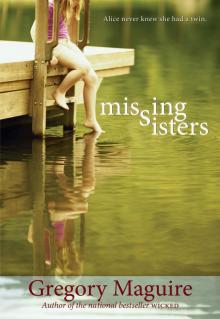 Missing Sisters
Missing Sisters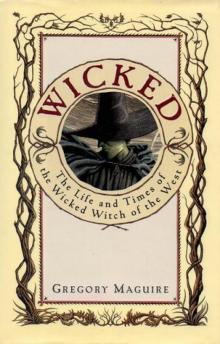 Wicked: The Life and Times of the Wicked Witch of the West
Wicked: The Life and Times of the Wicked Witch of the West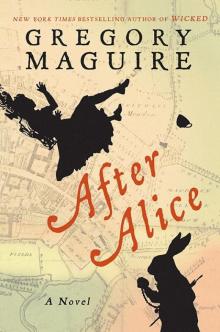 After Alice
After Alice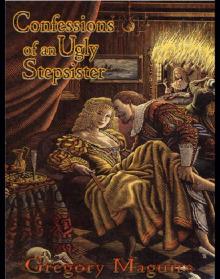 Confessions of an Ugly Stepsister
Confessions of an Ugly Stepsister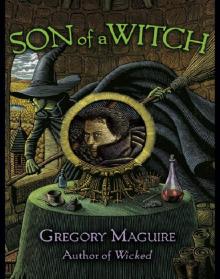 Son of a Witch
Son of a Witch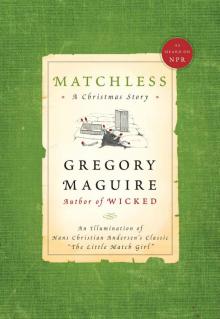 Matchless
Matchless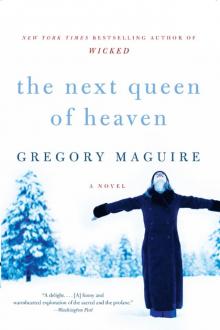 The Next Queen of Heaven
The Next Queen of Heaven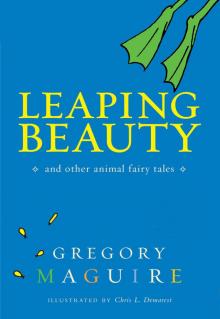 Leaping Beauty: And Other Animal Fairy Tales
Leaping Beauty: And Other Animal Fairy Tales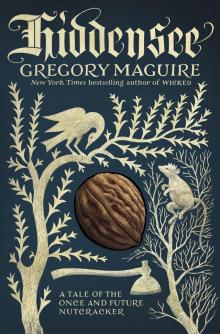 Hiddensee: A Tale of the Once and Future Nutcracker
Hiddensee: A Tale of the Once and Future Nutcracker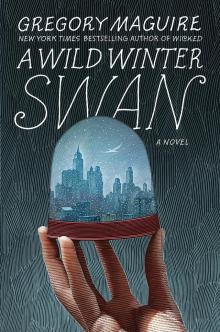 A Wild Winter Swan
A Wild Winter Swan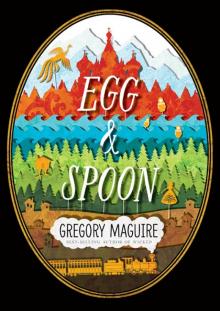 Egg & Spoon
Egg & Spoon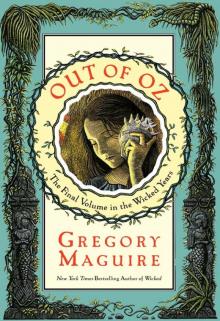 Out of Oz
Out of Oz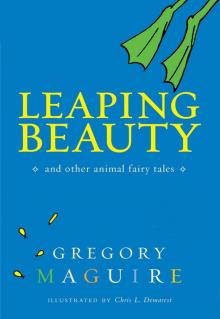 Leaping Beauty
Leaping Beauty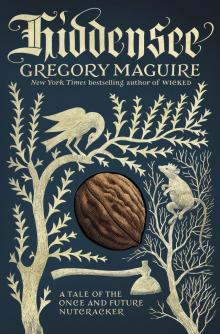 Hiddensee
Hiddensee The Wicked Years Complete Collection
The Wicked Years Complete Collection The Next Queen of Heaven: A Novel
The Next Queen of Heaven: A Novel